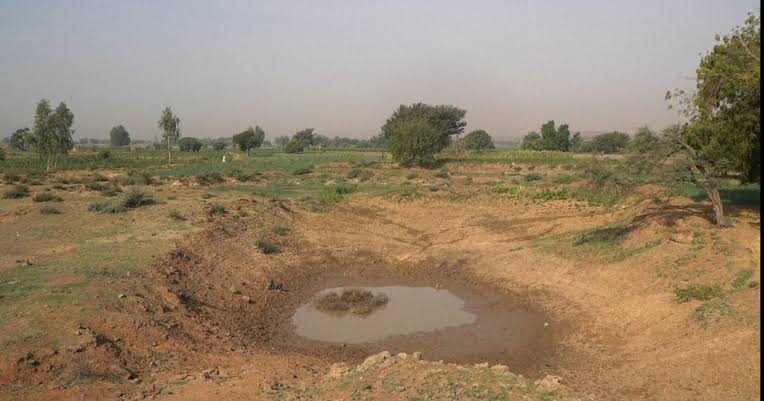Climate Change: Water Sources Depletion Worsening Nigeria’s Food Crisis

By Abbas Nazil
Nigeria’s food security crisis is worsening as climate change, poor infrastructure, and water scarcity devastate agricultural productivity across the country’s arid northern regions.
Farmers like 62-year-old Muazu in Sokoto State are struggling to keep crops such as millet and maize alive as rivers that once irrigated their land have dwindled into murky puddles.
Without the resources to dig wells or invest in modern irrigation systems, Muazu, like many smallholder farmers, is on the verge of abandoning his livelihood.
The northern region, responsible for producing the bulk of Nigeria’s food, is grappling with longer dry seasons, shrinking rivers, and extreme heat that has altered traditional farming calendars.
The short and sometimes intense wet season no longer compensates for the extended periods of drought.
With more than 80 percent of Nigeria’s farmers being smallholders who contribute around 90 percent of the nation’s agricultural output, the implications for national food supply are severe.
The impact of these changes is being felt throughout the country, with prices of northern-grown crops soaring in southern cities like Lagos.
According to the World Food Program, over 31 million Nigerians are already facing food insecurity.
Rising temperatures and changing rainfall patterns have affected over 1,250 hectares of farmland in Adamawa State alone, the National Emergency Management Agency reported.
Yet, a lack of comprehensive data on smaller water bodies has obscured the full extent of the crisis. Farmers, however, consistently report worsening conditions year after year.
The collapse in yields is exacerbated by a lack of investment in climate-resilient infrastructure.
Daniel Obiora, president of the All Farmers Association of Nigeria, criticized the government for failing to build dams and support adaptive farming technologies.
Meanwhile, the over-extraction of groundwater and rampant deforestation are compounding water scarcity.
In Sokoto State, over two-thirds of the tree cover has been lost, contributing to desertification and higher temperatures.
Efforts by the government to address the crisis remain largely symbolic. President Bola Tinubu’s administration declared a food security emergency in 2023 and proposed activating 500,000 hectares of farmland in Nigeria’s land banks.
However, these plans have yet to materialize. Despite claims of increased investment in agriculture, the sector’s contribution to GDP declined to 22 percent in Q2 of 2024, down from 25 percent the previous quarter.
Simultaneously, household food imports surged by 136 percent from 2023 to 2024, highlighting Nigeria’s growing reliance on foreign food amid a domestic production crisis.
In Sokoto, farmers like Nasiru Bello are forced to pump groundwater at high cost just to keep their crops alive, further straining their already meager incomes.
Gasoline prices have made this option nearly unaffordable, and crop performance has plummeted. “The plants do not grow well as it did,” Bello lamented.
With Nigeria projected to become the world’s third most populous nation by 2050, experts emphasize the need for urgent action.
The U.N. Food and Agriculture Organization (FAO) advocates for climate-smart practices like drip irrigation to optimize water use.
However, local adoption remains limited due to lack of awareness and support.
Educators such as Yusuf Isah Sokoto urge stronger farmer education on climate resilience.
Without immediate and sustained intervention, Nigeria’s food crisis threatens to deepen further, placing millions more at risk.
